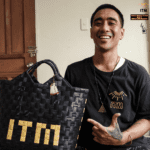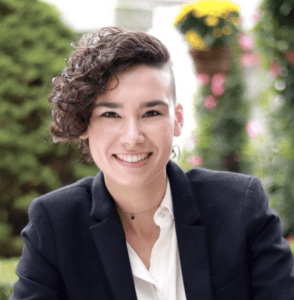
Editor’s Note: This article was originally published December 21, 2021. We’re re-posting in observance of Asian-American & Pacific Islander Heritage Month.
“Some customers have been complaining about our packaging,” explained my friend Ate (older sister) Mani during one of our “helping bayóng” meetings. “Because we’re using recycled boxes to deliver our products, they probably think that we smoke a lot because ‘Marlboro’ is printed on every box we send them.”
I couldn’t help but burst out laughing.
This project of ours is a small business, 100% owned and operated by working-class mothers like Ate Mani, along with a handful of fathers and youth. We sell iterations of the bayóng, a handmade Philippine weave that typically serves as a bag for shopping at the wet market and for vending goods (hence the name, helping bayóng).
The NGO that I work for, Servants to Asia’s Urban Poor, has partnered with them in this business as a way to help families earn some much-needed extra income. Most of the families that run helping bayóng work as street vendors and typically make around $7 USD for a whole day’s work. These are families I’ve had the privilege of eating and laughing with, whose homes I show up to for birthday parties, and whose kids have even become my godchildren.
And yet theirs are the names and faces that current realities of systemic poverty here in the Philippines have left forgotten on the margins.
To illustrate the Philippines’s notoriously blatant socioeconomic inequality, “Jinkee” Pacquiao, the wife of retired boxer and now 2022 Presidential Candidate Manny Pacuqiao, wore a dress worth over $39,000 USD to her husband’s final boxing match.
She wore to a fight a dress that is worth 15 times what my working-class friends like Ate Mani make in a year. Ironically, or perhaps I should say “unsurprisingly” given the not-so-secret history of extravagant lifestyles practiced by many famous Filipino Christians dating back to the Imelda Marcos days, the Pacquiaos are also devout and outspoken evangelical Christians.
If you were to sit down with Jinkee and ask about her not-so-affordable fashion choices, I’m sure that she wouldn’t hesitate to give thanks to God for these “blessings” and “provisions” that she and her family have received. Perhaps she’d even play defense by saying something about how she gives to the needy just as much as, if not more than, she spends on herself.
Such seems to be the common rebuttal among wealthy Christians whenever they are probed about their luxurious lifestyles.
And yet, when I look at the Jesus portrayed in the Gospels, this same Jesus that Filipinos like Jinkee are so vocal about calling their Lord and Savior, I can’t help but wonder if he himself would say that Jinkee’s $39,000 dress is a “blessing.”
It’s hard for me to imagine that the same person who told the wealthy of his day to sell all they have and give to the poor would turn around and tell Jinkee Pacquiao that he wants to bless her with another trip to the nearest Versace or Gucci store, all while everyday people like Ate Mani are sweating in the scorching Manila heat as they sell their lumpía for less than 15 cents a piece.
I don’t mean to rag too much on Jinkee Pacquiao. After all, I believe that her lifestyle is simply symptomatic of a consumer culture that has cleverly infiltrated Christian practice wearing the well-branded guise of “blessing” and “provision” vocabularies and Christianisms.
Still, this language that calls a $39,000 dress a blessing from God feels hopelessly tone-deaf, given the harsh realities of socioeconomic inequality that remain so shamelessly visible throughout the sprawling metropolis of Metro Manila.
Like the tone of a note hopelessly off-pitch, I hear the irony in my Christian friends’ comments that their condo unit is, as they put it, “such a blessing.”
If a community of informal settlers had to be displaced just so this condominium could be built, can we really say that it is a “blessing” for the Christians who now live in it? Privilege, yes, but calling it a blatant blessing seems to be what Philippine national hero Jose Rizal would call a “tour de force of the imagination” (Rizal-Pastells correspondence, p. 187).
In bringing up these anecdotal points, I simply hope to help us stop and reflect on how acts of consumption have become so normalized in our evangelical practice that they are often excused as exercises of divine sovereignty before they are given accusations of “conforming to the patterns of this world,” as the Apostle Paul might put it.
Whether it’s a suburban church that budgets for the latest Apple M1 iMac to use for its worship slides and sermon PowerPoints, or missionaries who fundraise so that they can rent out a nice condo in an exclusive neighborhood like my friend’s, I feel that these acts of consumption have become as familiar to our faith practice as do prayer and reading Scripture.
Yet when we consider the history of modern consumer culture as a legacy of Western Europe’s Industrial Revolution, which has justified bloody military conquest and colonial expansion all for the gospel of profit, I believe that we lack quite a bit of suspicion in how we regard these habits of consumption that have so much influence on our sacred spaces.
What’s more, living in heavy insulation and isolation from communities like Ate Mani’s can often blind us to how strange this whole normalization of rampant consumption has become within the walls of our congregations.
As we just celebrated the season of Advent, I feel it’s appropriate to reflect on how we can better taper the excessive aspects of our lifestyles to better embody the person whose birth and incarnation we wait for at this time every year. As a person who has chosen into a lifestyle of downward mobility in an urban poor community of Metro Manila, I have come to realize that acts and habits of simplicity are actually less about what we give up and can be more about what we get to receive.
“Giving up” the comfortable excess of my American life (for a season at least) has brought me into relationships with people like Ate Mani. I’ve even been able to find a feeling of home in my community this past year in ways that I never did back in the US.
But such is the paradox of the parable, isn’t it? I believe that shaping our faith and practice in the likeness of Jesus’ simple lifestyle as a wandering, grassroots rabbi who spent most of his time with the poor and marginalized can actually free us up to catch greater glimpses of what his Kingdom is like, just as one might notice a mustard seed hidden amongst much larger seeds or find treasure buried in an abandoned field. Or, perhaps, like finding a bayóng packaged in a Marlboro box.
 Timothy Sean Ignacio is a 2nd-generation Filipino-American from California’s Central Valley who moved to Manila in 2018 to work for Servants to Asia’s Urban Poor. Rather than call himself a “missionary,” he is reclaiming the Tagalog word “balikbayan” (one who returns to their land) as an act of spiritual decolonizing and an expression of solidarity with his kababayans (people of the same land) in the Philippine archipelago. Using the alias “ITM” (reiteration of the Tagalog word itim, meaning dark), he also uses his passions as an emcee/hip-hop artist and creative in hopes that his music, vlogs, and writings can inspire others to both reclaim their own identities and form meaningful connections back to their motherlands. For more of his content, check out his music as “ITM” on all major streaming platforms, his vlog series “Balikbayan Not Missionary” on YouTube, and his social media handle: @sobrangitm (Instagram, Facebook, TikTok).
Timothy Sean Ignacio is a 2nd-generation Filipino-American from California’s Central Valley who moved to Manila in 2018 to work for Servants to Asia’s Urban Poor. Rather than call himself a “missionary,” he is reclaiming the Tagalog word “balikbayan” (one who returns to their land) as an act of spiritual decolonizing and an expression of solidarity with his kababayans (people of the same land) in the Philippine archipelago. Using the alias “ITM” (reiteration of the Tagalog word itim, meaning dark), he also uses his passions as an emcee/hip-hop artist and creative in hopes that his music, vlogs, and writings can inspire others to both reclaim their own identities and form meaningful connections back to their motherlands. For more of his content, check out his music as “ITM” on all major streaming platforms, his vlog series “Balikbayan Not Missionary” on YouTube, and his social media handle: @sobrangitm (Instagram, Facebook, TikTok).


